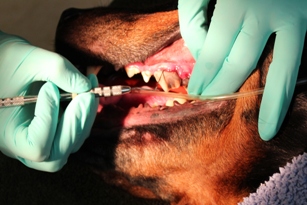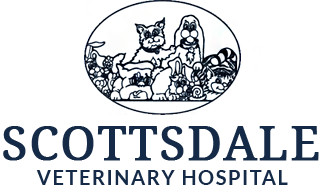Prevention of Dental Disease
Dental disease commonly affects 80% of all dogs and cats over the age of 5 years. However many of these problems can be prevented by instituting a preventative health program from an early age. At Scottsdale Veterinary Hospital we recommend starting this preventative health program as early as 3-4 months of age for your kitten or puppy. As “babies” we want to gain their acceptance of examining the mouth and teeth. Simply lifting the lips and touching the teeth is all that is required prior to 6 months of age when they have only their deciduous (baby) teeth. It is important to make sure this is as fun and pleasurable as possible. You can reward your pet for allowing you to touch their teeth by giving them a treat or playing a game right after examining their mouth. Once past 6 months of age, when the adult teeth are all present, then it becomes crucial to begin brushing their teeth even if it is only once weekly. Make sure you maintain the treat or game to keep this a fun or at least well tolerated activity.
The American Veterinary Dental College (see link: http://www.avdc.org/home.html) provides much valued information on both the prevention and treatment of dental disease in cats and dogs. Fortunately prevention of dental disease by the frequent removal of plaque and tartar can be assisted by a number of dental products and several special dental diets. The Veterinary Oral Health Council (VOHC), which is a branch of the American Dental College, awards its seal of acceptance to products that successfully meet pre-set criteria for effectiveness in controlling plaque and tartar deposits in dogs and cats. Looking for this seal of approval will help you select products/diets that have scientific research proving their effectiveness.
One such VOHC approved diet, which has helped many of our pets, is the Royal Canin Dental diet, available for both dogs and cats. This diet provides both a mechanical action and an ability to prevent mineralization of plaque to hard tartar/calculus. Royal Canin’s dental diet can be transitioned as the next diet stage following the puppy/kitten development diet. It is an excellent aid in maintaining not only oral health but a healthy skin, coat, and digestive tract.
 A key component of maintaining good oral health for your cat and dog is a yearly physical examination by your veterinarian. This annual examination not only evaluates the status of your furry friends oral health but also all other body components such as ears, eyes, skin, heart, lungs, abdominal organs as well as many joints. If your pet has significant tartar build up and or gingivitis your veterinarian will recommend a proper dental cleaning (above and below the gum line) and evaluation of all their teeth while under a general anesthetic. At Scottsdale Veterinary Hospital we try to encourage a dental cleaning before significant periodontal disease occurs which is often a stage where your pet will require tooth extractions to remove sore and/or abscessed teeth.
A key component of maintaining good oral health for your cat and dog is a yearly physical examination by your veterinarian. This annual examination not only evaluates the status of your furry friends oral health but also all other body components such as ears, eyes, skin, heart, lungs, abdominal organs as well as many joints. If your pet has significant tartar build up and or gingivitis your veterinarian will recommend a proper dental cleaning (above and below the gum line) and evaluation of all their teeth while under a general anesthetic. At Scottsdale Veterinary Hospital we try to encourage a dental cleaning before significant periodontal disease occurs which is often a stage where your pet will require tooth extractions to remove sore and/or abscessed teeth.
Clinical signs indicating severe dental/oral disease in cats and dogs may include:
- Bad breath
- Loose teeth or teeth significantly covered in tartar
- Bleeding from the gums or mouth
- Drooling or dropping food from their mouth
- Shying away from you when you touch particular mouth areas
- Loss of appetite or loss of weight
- Please note that these signs can be an indication of other serious health problems as well.
If you see any one of the above signs in your pet, you should seek the immediate attention of your veterinarian.
